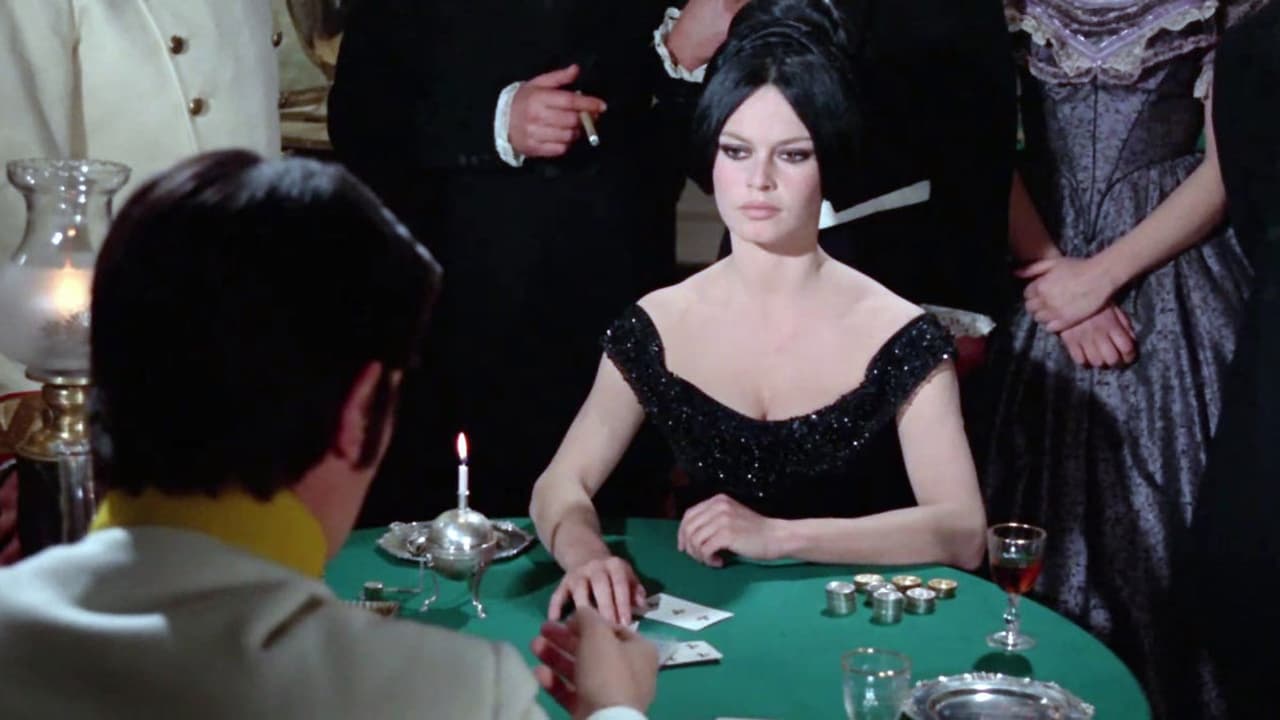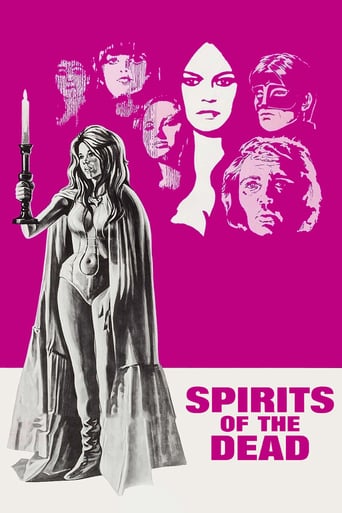Beystiman
It's fun, it's light, [but] it has a hard time when its tries to get heavy.
Patience Watson
One of those movie experiences that is so good it makes you realize you've been grading everything else on a curve.
Jonah Abbott
There's no way I can possibly love it entirely but I just think its ridiculously bad, but enjoyable at the same time.
Tayyab Torres
Strong acting helps the film overcome an uncertain premise and create characters that hold our attention absolutely.
joeaugustynwriter
Three directors, one clear winner. Federico Fellini's segment is miles beyond the other two both technically and creatively. Ironically, his segment was the only one shot primarily on sets rather than locations, yet comes off the least artificial of the bunch.Vadim's segment opens the trilogy, and it's so bad it tempts one to stop watching. Just as he did in "And God Created Woman" with Bardot, his main focus seems to be showing off his trophy wife Fonda, who parades around in ridiculously scanty costumes that are as wrong for the period depicted as her mod era lipstick and ultralashes. The script is a meandering mess and the only interesting visual elements are the locations. Even the lovely Jane Fonda looks more laughable than alluring, displayed like a prize poodle.Malle's is better directed but fairly anemic. Not much else to say about it.Fellini's segment is wonderful, with the same outstanding qualities as his best feature films, including a hauntingly playful soundtrack by Nino Rota and the masterful cinematography of Giuseppe Rotunno.While Vadim's segment was crude and flashy with hokey costumes and cheesy opticals, Fellini's is elegant and magical, a darkly surreal tapestry woven from realistic threads, rendered through his uniquely trippy perspective. Every image is lit and framed with care. Even the swirling mist from his fog machine seems to be obeying his direction.His cast runs the gamut from subtly grotesque to enticing, with a fatally debauched Terence Stamp straddling the two. His psychological breakdown and descent into hell are beautifully written and superbly directed. He's also the only character in the entire movie you can feel for, someone who took a wrong turn in life and finally embraced the consequences.Like others have said, skip to Fellini... or watch all three and judge for yourself.
Hitchcoc
Many of the reviewers were on the same page. I have to fall in line, I'm afraid. The first of the trio, "Mazzengerstein", was just plain dull. You have the beautiful young Jane Fonda becoming an heiress from hell. She runs the show at all times because of her financial power. Don't cross her. However, could they have chosen someone else but brother Peter as the ultimate love interest? Fortunately, I didn't notice him in the credits. Beyond that, the story was slow moving and downright dull. "William Wilson" is a great example for English teachers of the "Doppelganger" story. In this one the young Wilson does terrible things, primarily to women. He is a psychotic. Getting quite Freudian, we see where his corporeal superego moves in to stop him. Unfortunately, in at least one case, the damage has been done. The story works better than the first, but it is hackneyed. In the third, Terrence Stamp, "Far from the Madding Crowd," is an alcoholic actor who comes to Italy to make a weird western. He is accosted by the paparazzi and driven to distraction. Of course, he is drunk the whole time. But in typical Fellini fashion, he is met by a herd of surrealist images. He has been promised a Ferrari and when he gets his hands on it, he goes crazy. We can see this coming, but no one can create a nightmare world like the wonderful Fellini. All in all, I had never heard of this film and hung in there until the highly superior last offering.
classicsoncall
The quote in my summary line was spoken by the 'good' Wilson to the 'bad' Wilson (Alain Delon portrayed both) in the second chapter of this Poe based trilogy, so if you saw it you know what it means. It was the single sentiment that had application to each of the stories presented here because death was involved in each one. Reading a handful of other reviews for the picture here, it appears that many of them simply dismiss the first two segments and favor the 'Toby Dammit' piece directed by Federico Fellini. For myself, I found all three chapters to be about equally worthy.With the piece on 'Metzengerstein' however, I'm pretty sure they wouldn't have had those flagrant, colorful costumes in whatever era the story represented. They're primarily used to augment Jane Fonda's physical assets, who a couple of times provides her own interpretation of riding bareback. No surprise there, as this was directed by Fonda's husband at the time, Roger Vadim, who utilized a similar soft porn technique in the same year's "Barbarella", also starring Fonda. If I had been in charge of the story, my twist ending would have had Peter Fonda's character emerge once again after the Countess (Jane) perishes. I'm sure they could have worked that out.The piece on William Wilson (Delon) and his doppelganger who kept showing up during stages of his life was an interesting concept. I don't know about Brigitte Bardot as a dark haired beauty though, that was a distraction. Keep an eye on that final card game when Giuseppina (Bardot) loses it all, Wilson deals himself two cards in a row during the final hand. Why wouldn't she call him on it? The 'Toby Dammit' chapter was based on Poe's novel 'Don't Wager Your Head to the Devil" which makes every bit of sense at the final scene. What I was more concerned about was they never got around to filming that Catholic Western Toby (Terrence Stamp) traveled to Rome for. I thought there was some potential there. Toby himself is an arrogant, spiteful, condescending and neurotic actor who hates his audience, making me wonder why he was treated like such a super star. Served him right at the end of the story when he crashed his Ferrari off the bridge at the behest of his friendly and joyful devil. It wouldn't be the first time a guy lost his head over a pretty young thing.
airynellie
I didn't care for "Metzengerstein" that much at all (in a nut-shell: Jane Fonda's character walking around in strange, skimpy outfits, chasing after her cousin whenever she wasn't at an orgy), but the next two were great. "Toby Dammit" was definitely the most disturbing movie of the trio, but the cinematography was incredibly beautiful; I'd give it a 10 just for that. But I liked the "William Wilson" segment the most, and I would (and have) watched it again and again just to see Alain Delon, who was at the peak of his exotic beauty in this film. A plus is that, in "William Wilson," he didn't have the regulation tan all the good-looking actors of the time seemed to maintain. I personally always thought that the tan detracted somewhat from his looks, making him look less unique, less refined. Come to think of it, there are actually two pluses when it comes to Delon -- he looks like a porcelain, icy angel, and he gets to put that expressive face to work for a very welcome change, instead of going through almost the entire movie with a stony expression (think "The Sicilian Clan").

